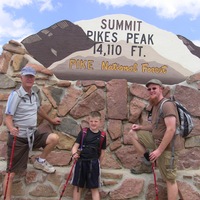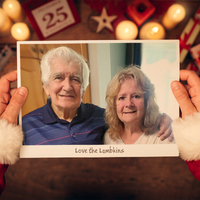A “Day In The Life” of an Interventional Cardiologist with Dr. Raj Makkar
Written By: Allison DeMajistre, BSN, RN, CCRN
Medical Expert: Raj Makkar, MD, Professor of Cardiology, Cedars-Sinai Medical Center
Reviewed By: Adam Pick, Patient Advocate, Author & Website Founder
Published: November 19, 2024
Right now is a transformational time for the minimally-invasive treatment of heart valve defects including aortic stenosis and mitral regurgitation. During the past 10 years, the use of transcatheter devices to replace and repair valvular disease has skyrocketed. For example, the number of transcatheter aortic valve replacements (TAVR) has soared from 4,600 cases in 2012 to over 100,000 cases in 2023, according to the Journal of the American College of Cardiology.
Interestingly… During a recent survey of 988 patients in the HeartValveSurgery.com community, we learned that 53% of patients are not aware of the critical role of interventional cardiologists for the lifetime management of heart valve disease. For this specific reason, we were thrilled when Dr. Raj Makkar, a world-renowned interventional cardiologist who has performed over 7,000 transcatheter heart valve therapies, invited us to spend an entire day with his team at Cedars-Sinai Medical Center in Los Angeles, California.
Key Learnings About Interventional Cardiologists
Here are key learning about the role and importance of interventional cardiologists for the lifetime management of heart valve disease:
- What does an interventional cardiologist do? According to a recent survey we did of the patients in our community, only a surprising 53 percent know what an interventional cardiologist does. Dr. Makkar explained, “An interventional cardiologist does the most minimally invasive cardiac surgery without any incisions in the chest.” He said that they can fix a leaky valve, a narrow valve, or a blockage in the artery all with a puncture to the artery of the wrist or groin. “It’s what the surgeons do, but we do it absolutely minimally invasively.”
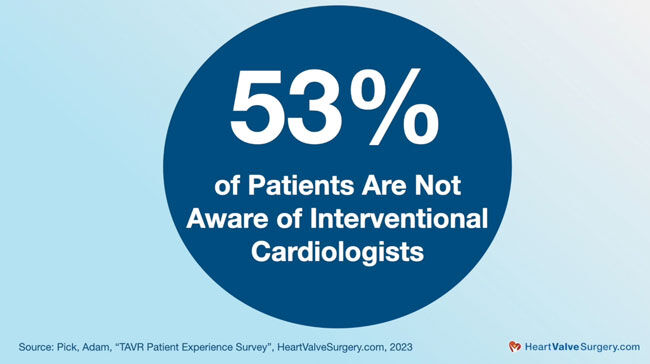
- What is the interventionist role within a heart team? “It’s very important to point out that the best management of patients occurs with the heart team approach,” said Dr. Makkar. He explained that the heart team consists of the interventional cardiologists, the surgeons, the general cardiologist, and the patient’s primary physicians. There are also imaging specialists involved who do CT angiography and echocardiograms. Essentially, the interventional cardiologist does the procedure but has this entire heart team to help with the overall management of the patient.
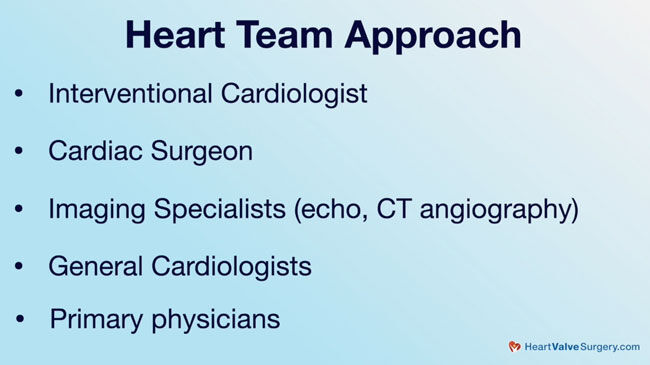
- Why have interventional cardiologists become so important for treating heart valve disease? “Fortunately for patients, the technology has evolved,” said Dr. Makkar. “I think the interventional cardiologists have had this goal and objective of doing what the cardiac surgeons have done with less invasive approaches. I have to say that both the surgeons and interventional cardiologists have worked together because these patients are less ideal candidates for surgery with the aging population. The technology has evolved to fill in that gap and provide more alternatives to our patients who are much older and would be less ideal for surgery.” Makkar explained that in addition to the evolving technology, patients want to achieve a solution to their problem with the least invasive approach. “So all of these things have come together and increased the role of interventional procedures in patients with cardiac disease,” he said.
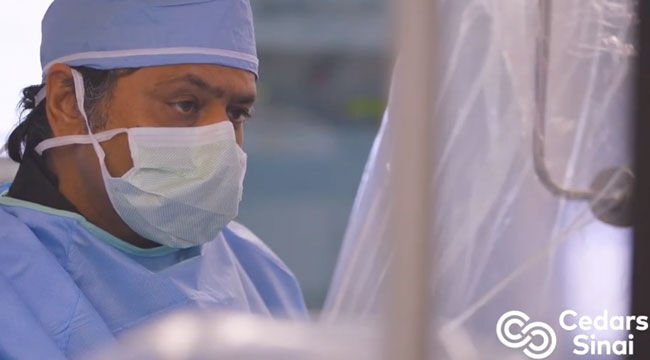 Dr. Raj Makkar in the Catheter Lab
Dr. Raj Makkar in the Catheter Lab
- What are the benefits that patients experience with transcatheter devices? “I think the most important benefit for patients is the minimal invasiveness,” Dr. Makkar said. “If we can do a procedure without big incisions and general anesthesia, that translates into much faster recovery for patients. Early ambulation, early discharge, and getting back to work are all very positive attributes for the patients,” he explained. “I think the important thing is to make sure we do not sacrifice efficacy for convenience.”
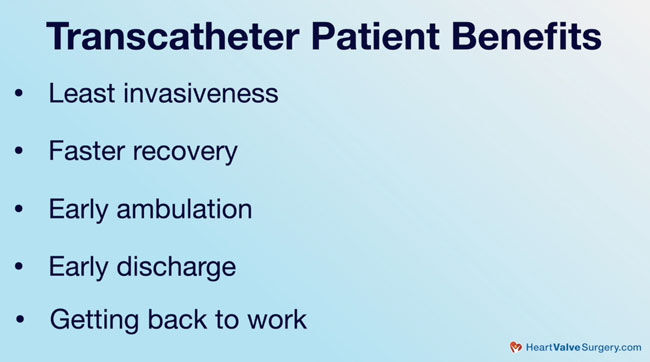
- What is a typical day like in your life here at Cedars? When do you get here, and can you talk about the procedures? “Well, this morning we all got together with a heart team approach,” he said. “We discussed patients who had mitral and tricuspid valve issues. As a group, we reviewed their imaging findings and decided the best possible approach by determining whether they would be good candidates for surgery, transcatheter options, or if they needed to get into clinical trials.” He continued, “Today happens to be an interesting day in our lab. We are going to do three tricuspid valve replacement procedures. We have two patients who will undergo transcatheter aortic valve replacement, and we have a patient who will undergo transcatheter mitral valve edge-to-edge repair. It’s a fun day in the cath lab.” Makkar described some of his cases that day, and we watched a live transcatheter mitral valve repair case. The patient had regurgitation, and the repair was to help minimize that by clipping the mitral valve leaflets. He used a Pascal device made by Edwards Lifesciences. The entire procedure was done without an incision to the ribs or chest.
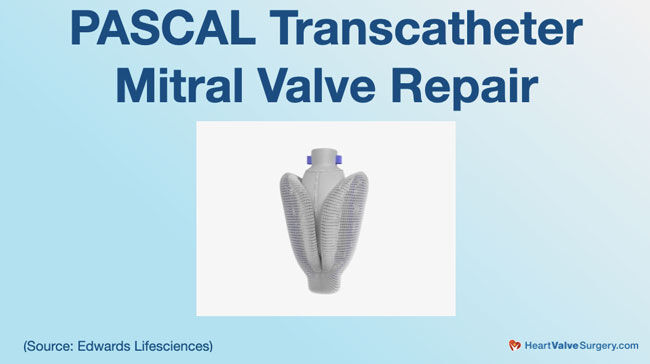
- Although we were able to see the procedures, I wanted to know firsthand from Dr. Makkar how he thought they went: “I’m glad you had a good time watching, and I’m still amazed by these procedures,” he said. “I do them every day, and today, we had a good day. Thankfully, all the patients did well, so I’m hoping we can discharge at least four of these seven patients who’ve undergone these transcatheter heart valve procedures tomorrow and hopefully the rest the day after. So, all in all, it was a good day.”
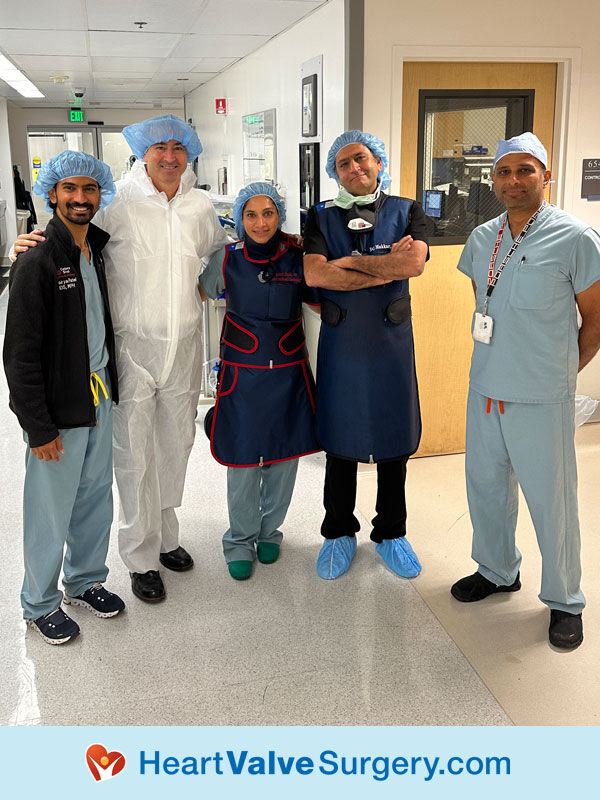
- When does Dr. Makkar’s typical day end? “I’m typically done with my procedures around 7 pm, and then I spend time with the fellows and go over the plan for the next day,” he explained. “There is also academic work that goes on. The academic work of research and advancing some of these things occurs on the weekends and at night. Thankfully, it doesn’t feel like hard work. I feel very fortunate to have the privilege of doing what I do and that it really helps patients.”
Thanks Dr. Makkar and Cedars-Sinai Medical Center!
On behalf of all the patients in the HeartValveSurgery.com Community and patients all over the world, thank you so much for your time today, Dr. Raj Makkar! Also, thank you Cedars-Sinai Medical Center, for caring for heart valve patients!
Related Links:
- Inside Access to Dr. Raj Makkar’s Heart Valve Catheter Lab at Cedars Sinai!
- See Dr. Raj Makkar’s Interactive Interventional Cardiologist Profile
Keep on tickin’ Dr. Makkar!
Adam
P.S. For the deaf and hard-of-hearing members of our community, I have provided a transcript of this video below.
Video Transcript:
Adam Pick: Hi everybody. It’s Adam with HeartValveSurgery.com and we are in Los Angeles, California at Cedars Sinai Medical Center. I am thrilled to be joined by Dr. Raj Makar, who is the Professor of Cardiology and the Vice President Cardiovascular Innovation and a Director of Interventional Cardiology. Dr. Makar, it is great to see you again and thanks so much for being with me today.
Dr. Raj Makkar: It’s a pleasure, Adam, to see you.
Adam Pick: Dr. Makar, we’re here. You’ve given us this incredible access. I just saw you perform a transcatheter case and I’ve got a question for you. According to a recent survey that we did of our patients, 53 percent of the people watching this video Do not know what an interventional cardiologist is.
So could you share with our community, what is it that you do?
Dr. Raj Makkar: An interventional cardiologist does the most minimally invasive cardiac surgery, if you want to call it, but these are all done without any incisions on the chest. Essentially, all our procedures, whether it is fixing a blockage in the artery or whether it is actually fixing a leaky or a narrow valve, are done through a puncture in the artery, whether it is in the wrist or whether it is actually in the groin.
So that is what an interventional cardiologist is. It’s what the surgeons do, but do it absolutely minimally, minimally invasively.
Adam Pick: Can you talk about the interventionalist role within a heart team?
Dr. Raj Makkar: So, I think it’s very important to point out that the best management of patients occurs with the Heart Team approach.
And that involves not just the interventional cardiologist, but the surgeons, the imaging specialists, you know, the echocardiographers, CT angiography, the general cardiologist, and of course, the primary physicians of the patients. So, the interventional cardiologist does the procedure, but there are all of these people that surround the interventional cardiologist.
Adam Pick: Why have interventional cardiologists become so important for the treatment of heart valve disease?
Dr. Raj Makkar: Fortunately for patients, uh, the technology has evolved. And I think the interventional cardiologists have had this goal and objective of doing what the cardiac surgeons have done with less invasive approaches.
And I have to say that both the surgeons and interventional cardiologists have actually worked together because with the aging population, these patients are less ideal candidates for surgery. And the technology has evolved to fill in that gap and provide more alternatives to our patients who are much older and would be less ideal for surgery.
And there is this profound desire amongst all patients, right? If you can achieve a solution to your problem with the least invasive approach, that is the one they actually really prefer. So all of these things have come together and increased the role of interventional procedures in patients with cardiac diseases.
Adam Pick: Can you share all the benefits that patients are experiencing with transcatheter devices?
Dr. Raj Makkar: I think the most important benefit to the patients is least invasiveness. So if we can do a procedure without big incisions, without general anesthesia, if possible, that translates into much faster recovery for patients.
Early ambulation, early discharge, getting back to work early. And these are all very positive attributes for the patients. I think the important thing is to make sure that we do not sacrifice efficacy for convenience.
Adam Pick: Now let’s talk about a day in your life here at Cedars. What happens on a day like today? When do you get here and talk about the procedures?
Dr. Raj Makkar: Well, for example, uh, this morning we all got together and we discussed in a hard team approach You know, we discussed patients who had mitral valve issues and tricuspid valve issues. And as a group, uh, we went through their imaging findings and decided what would be the best possible approach, whether they would be good candidates for surgery or not or good candidates for transcatheter options, whether they need to get into clinical trials.
Today happens to be an interesting day in our lab. We are going to do three procedures, uh, of transcatheter tricuspid valve replacement. We have two patients that will actually undergo transcatheter aortic valve replacement.
And we have a patient that will undergo transcatheter mitral valve edge to edge repair. It’s a fun day in the cath lab.
Adam Pick: So Dr. Makar just described some of the cases he’s doing today, and we are watching live a transcatheter mitral valve repair case. The patient has regurgitation, and this is going to help minimize that by clipping the mitral valve leaflets.
And this device that you can see here is the Pascal device made by Edwards Life Sciences. And again, this is done without an incision to the chest or the ribs.
Adam Pick: Dr. Makar, I just had a fantastic experience seeing you and your team cath labs performing these incredible procedures. How did they go?
Dr. Raj Makkar: I’m glad you had a good time watching these, uh, amazing, uh, I’m still amazed by these procedures.
I do them every day, but you know, we had a good day. Thankfully, all patients did well, you know, so I’m hoping that we can discharge, you know, at least four out of these seven patients. You know, tomorrow we’ve under undergone transcatheter heart valve procedures and maybe the rest the day after. So I think all in all it was actually a good day.
Adam Pick: Here in the day in the life, when does your day end?
Dr. Raj Makkar: I’m typically done, um, with my procedures around 7 p. m. and I think that it’s time to sort of spend time with the fellows, go over the plan for the next day. But there is academic work that goes on. Academic work of research and advancing some of these things occurs on the weekends and it occurs at nights.
But it doesn’t feel like hard work, thankfully. I feel very fortunate that I have the privilege of doing what I do and it happens. That it actually really helps patients.
Adam Pick: Well, Dr. Makar, on behalf of all the patients in the heart valve surgery. com community, patients all over the world. Thanks so much for your time today.
I’ve enjoyed this day in the life and it’s great to see you again, Dr. Makar. Thank you. Thank you so much, Adam.

